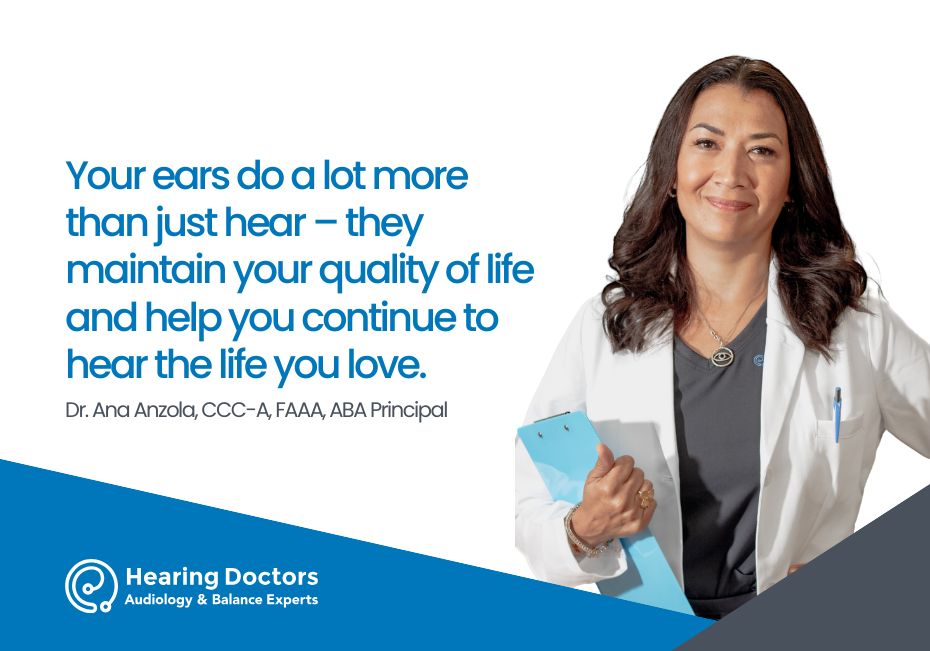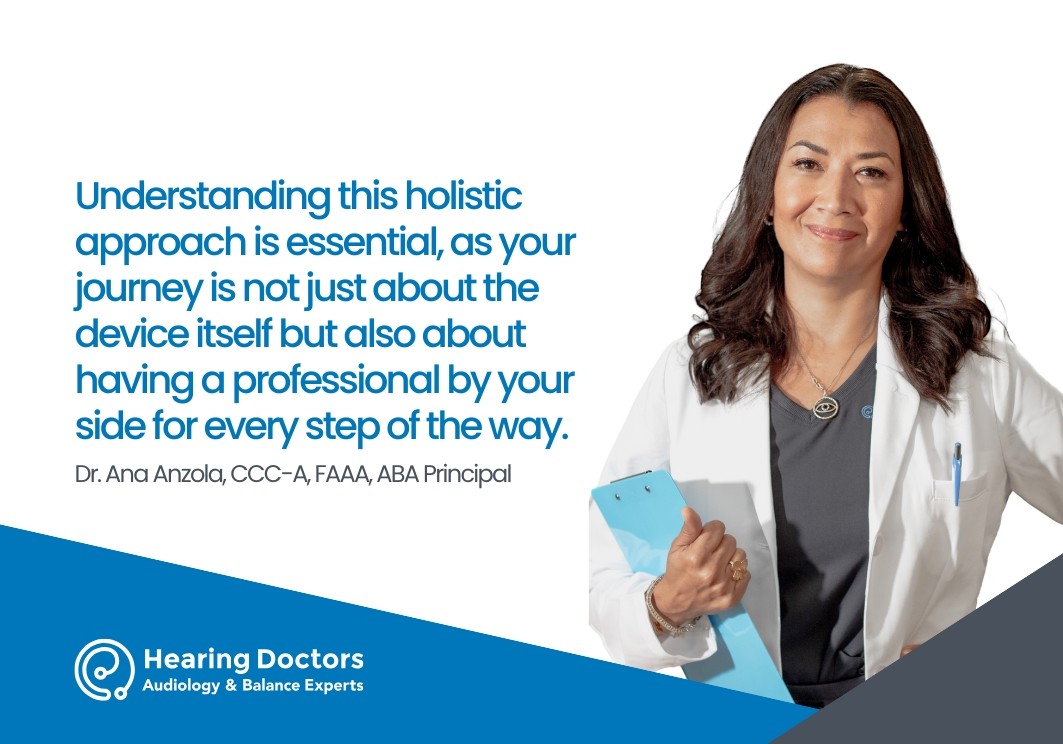May 4, 2020
Dr. Ana
Anzola, CCC-A, FAAA, ABA Principal
During these unprecedented times of social isolation, communication is essential for your mental health and well-being. Whether talking with a loved one over the phone, participating in a video chat with grandchildren, or simply listening to the television or radio, Hearing Doctors is here to ensure that you are able to take part in and enjoy these aspects of life.
CAN COVID-19 CAUSE HEARING LOSS?
Although it is much too early to know for certain whether the novel Coronavirus (COVID-19) could impact a person’s hearing, a study by the US National Library of Medicine’s National Institutes of Health discusses the effects of various viral infections on hearing. The study found that “a number of viral infections can cause hearing loss.” (1)
How Do Viral Infections Affect the Auditory System?
Viral infections can affect the auditory system in different ways. Some have the potential to damage inner ear structures (such as inner ear hair cells and associated blood vessels) directly, while others damage the same structures indirectly via inflammation. Viral infections can also increase one’s susceptibility to a variety of other infections which can result in varying degrees of hearing loss. There are also many viral infections which do not affect the auditory system at all.
If you are experiencing hearing loss, it is important to monitor your symptoms and seek the help of a hearing doctor.
COVID-19 IMPACT ON HEARING AND COMMUNICATION
Individuals who have hearing loss may also have a higher risk of contracting COVID-19. Hearing loss affects 72.4% of people over the age of 65 (3), and older individuals are more likely to be hospitalized if they contract COVID-19. This suggests that the global COVID-19 pandemic will impact a large number of people with hearing loss; therefore communication needs will be heightened during this pandemic.
Face Masks Cause Difficulty for Communication
The Centers for Disease Control and Prevention (CDC) recommends wearing cloth face coverings, or masks, in public settings where other social distancing measures are difficult to maintain.
It is important to recognize, however, that face coverings are an obstacle to effective oral communication. Because so many people are wearing these masks, including patients in healthcare facilities, employees working essential jobs, and “designated shoppers” in a family, important pieces of communication may be lost due to the physical barrier.
Study: Face Coverings Interfere With Speech
A recent study by Goldin, Weinstein, and Shinman, published in Hearing Review, shows that face masks can act as a low-pass acoustic filter for speech - which means that face masks interfere with speech, and consequently, hearing. High frequencies (2000-7000 Hz) can be decreased by 3 to 4 decibels (dB) for a common medical mask and close to 12 dB for the N95 mask.
The combined effect of decreased intensity (volume), speech being perceived as more muffled, ongoing extraneous noise, and lack of visual cues, will undoubtedly cause problems for many people with hearing loss.
Clear Spoken or Written Instructions Are Essential
Because elderly people are more prone to hearing loss, and many healthcare facilities have higher percentages of elderly patients, facial coverings to prevent the spread of COVID-19 have the potential to negatively affect communication in healthcare.
Good communication strategies between staff and patients, and access to clear spoken or written instruction is essential to minimize medication and treatment errors.
HEARING IMPAIRED POPULATION MORE SUSCEPTIBLE TO COVID-19
People over 65 years of age, and those who have chronic medical conditions such as cardiovascular disease and diabetes are more susceptible to serious complications of the COVID-19 Coronavirus. These conditions are more widespread in people with hearing loss. By extension, the population with hearing loss is more likely to experience serious impacts of COVID-19.
Hearing Loss 54% More Common in People With Heart Disease
A study conducted by Harvard University cited a staggering relation between heart disease and hearing loss; they found that hearing loss occurred 54% more often in people with heart disease than in the general population (7).
The American Heart Association is advising caution and preparation for people who have heart disease or who have survived a stroke. Based on current information, elderly people with coronary heart disease or hypertension are more likely to be infected and to develop more severe symptoms of COVID-19 (8).
Diabetes, Hearing Loss & COVID-19
While both diabetes and hearing loss come with their own sets of challenges, there is an overlap between these groups, and many people have to deal with both.
A study conducted by the National Institutes of Health found that hearing loss is twice as common in adults who have diabetes than in those who do not. Researchers noted that, as diabetes becomes more common, it could become a significant contributor to hearing loss (9).
People who have diabetes are no more likely to acquire COVID-19 than the general population; however, the concern is whether or not diabetics have a higher chance of experiencing serious complications from COVID-19. Because the body of a diabetic has a compromised ability to fight off an infection, people with diabetes are more likely to experience serious symptoms and complications (10).
IMPACT OF SOCIAL ISOLATION, LONELINESS
Public officials urge people to stay home and maintain social distance to combat the spread of COVID-19. With no known end in sight, there is concern that these measures will result in increased loneliness and depression from social isolation (2), as well as other health conditions.
Loneliness & Isolation More Common Amongst Hearing Impaired
A recent scientific report published by the National Academies of Sciences, Engineering and Medicine stated that 43% of adults aged 60 or older in the U.S. reported feeling lonely (11). It is well known that social isolation and loneliness can become more common with age, and this is often due to the onset of hearing loss or cognitive decline (12).
Loneliness Exacerbated by COVID-19 Social Distancing
If this significant number of people experienced substantial levels of loneliness before the Coronavirus pandemic, one can only imagine how many people are feeling its negative effects now.
STRESS WEAKENS IMMUNE SYSTEM, INCREASES CORONAVIRUS RISK
The stress from social isolation and the dangers of the Coronavirus can be extremely damaging. It may become a huge health risk, weaken the immune system, and lead to anxiety attacks, headaches, migraines, high blood pressure, diabetes, and gastrointestinal problems (13). And people with severe chronic health conditions are at an increased risk of developing more serious illnesses from COVID-19.
Stress Also Affects Hearing
Stress affects the entire body, including hearing, due to restricted blood circulation. This is because the sensory hairs of the inner ear require sufficient oxygen and essential nutrients provided by a continuous flow of blood. Without sufficient blood flow, the sensory hairs become damaged or die, and the sound stimulus received by the outer ear would be unable to be transformed into recognizable sound (14). When a person is experiencing chronic stress, they may not notice how many sounds they are missing or how severe their hearing loss has become.
IN CONCLUSION…
Although there is much uncertainty in today’s world, you should remain confident in your hearing care. Hearing Doctors is committed to providing you with the 5-star service you have come to know and expect. Our Doctors of Audiology are available by phone, by video conference, or by in-office appointment.
We are offering curbside assistance for dropping-off and picking-up repairs, and we are completing remote fittings and adjustments when possible. If you are in need of supplies (i.e. batteries or wax filters) we will be happy to mail them directly to you.
Health & Safety Precautions
After evaluating the most current information and reviewing all published guidelines, we remain confident in our ability to provide audiological care in a safe and healthy environment. We have implemented the following additional precautions in light of COVID-19, to protect the health and safety of our patients and staff:
We will maintain a clean and safe environment and continue to comply with OSHA and CDC infection control guidelines.
We have standard protocols in place to disinfect all surfaces and patient contact areas.
All instruments and products used during patient care are being sterilized or disposed of safely.
We have reviewed the procedures for proper hand hygiene and reinforced their importance for both staff and patients.
We have expanded and increased the frequency of cleaning and disinfection of all common areas and facilities.
Hand sanitizer is available for your convenience in the common area and exam room.
We have temporarily removed items that pose a risk for cross-contamination (books, magazines) and have discontinued complimentary coffee and tea service.
HEPA air purifiers with UV Germicidal protection have been installed in each office (Therapure 240).
Non-contact thermometers are being used to ensure everyone is without fever prior to entry.
Proceeding with these precautions in place will allow us to provide service while keeping your health as our top priority. It is of utmost importance to us that each and every one of our patients receives the help that they need during this difficult time. Please contact our office to speak with one of our hearing professionals or to schedule an appointment.
References:
https://eartohearonline.com/hearing-loss-hearing-aids-covid19-corona-virus/
CDC. Table A-6a. Age-Adjusted Percentages (with Standard Errors) of Hearing Trouble, Vision Trouble, and Absence of Teeth among Adults Aged 18 and over, by Selected Characteristics: United States, 2017. U.S. Department of Health and Human Services, Centers for Disease Control and Prevention, National Center for Health Statistics. Summary Health Statistics: National Health Interview Survey, 2017. https://ftp.cdc.gov/pub/Health_Statistics/NCHS/ NHIS/SHS/2017_SHS_Table_A-6.pdf. Published 2017. Accessed March, 2020
Goldin, A. Weinstein, B. & Shinman, N. (2020). How Do Medical Masks Degrade Speech Reception? Hearing Review, April 1, 2020, Retrieved April 4, 2020.
https://hearinghealthfoundation.org/blogs/hearing-loss-in-the-hospital
https://www.signiausa.com/blog/heart-health-hearing/
https://www.heart.org/en/coronavirus/coronavirus-covid-19-resources
https://www.nih.gov/news-events/news-releases/hearing-loss-common-people-diabetes
https://www.aarp.org/health/conditions-treatments/info-2019/study-isolation-health-risks.html
https://www.healthyhearing.com/report/52859-How-high-stress-can-lead-to-hearing-loss
Popular Blogs

Jun 3, 2025
Dr. Ana
Anzola, CCC-A, FAAA, ABA Principal
Understanding Types of Hearing Loss: Sensorineural, Conductive, and Mixed

May 21, 2025
Dr. Ana
Anzola, CCC-A, FAAA, ABA Principal
What Impact Is Artificial Intelligence Having on Hearing Aid Technology?

Apr 28, 2025
Dr. Ana
Anzola, CCC-A, FAAA, ABA Principal
Do You Think You’re Too Young for Hearing Loss?

Apr 15, 2025
Dr. Ana
Anzola, CCC-A, FAAA, ABA Principal
The Best Hearing Aids in 2025: Insights From a Doctor of Audiology


